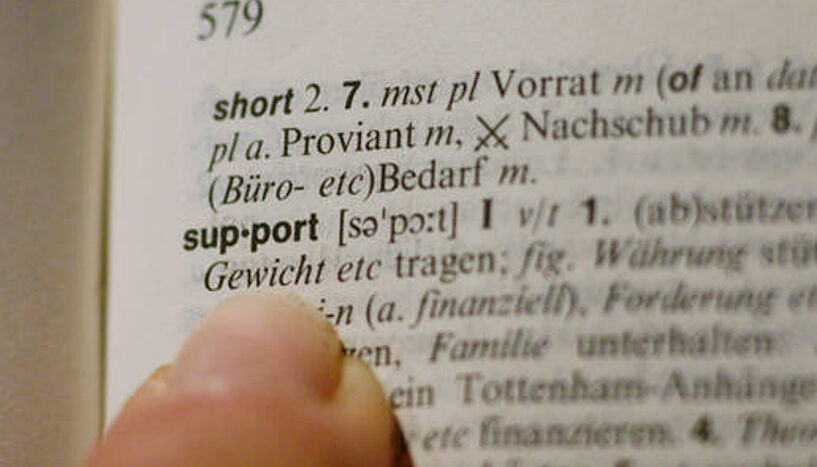Good, better, best practices in terminology
13. Mai 2013
A team of translation scholars from the Department for Translation Studies at the University of Vienna, in collaboration with terminologists from the Austrian Parliamentary Administration, the European Academy of Bolzano (EURAC, Italy), the language technology enterprise ESTeam (Sweden) and translation experts from CrossLang (Belgium), contributes to improving the management, quality and interoperability of large terminological databases by providing the necessary tools and best practices to terminologists.
"One person alone cannot maintain a database with more than one thousand entries", explained Tanja Wissik, translation scholar and vice-coordinator of the LISE project, which is funded by the EU with 1.25 million euros. "We concentrate on improving the management and quality of terminological databases containing more than one thousand entries".
LISE provides the solution
LISE stands for Legal Language Interoperability Services. The EU project focuses on legal and administrative terminology and aims at improving the quality of – often error-prone – terminological databases. The research team developed special tools to fight these errors.
"It may sound trivial, but all databases face typing errors and spelling mistakes", Wissik said, "in the project we developed a Cleanup tool that finds these errors, duplicate entries and terms attributed to the wrong language. If the English word 'judge' is stored as 'juge', the tool detects this error". Cleanup works automatically, but the terminologists always have the final say.
Following the Cleanup, Fillup enlarges the database by adding new terms. "Fillup is especially useful for smaller languages, e.g. Maltese", Wissik stated, "Fillup suggests terms from already existing translations. In IATE, the EU’s terminological database, many legal terms are available in English only. The goal is to facilitate the inclusion of all official languages, including those of accession countries. Especially in the legal domain the correct terminology is crucial when translating documents".
University of Vienna – cradle of terminology research
Gerhard Budin from the University of Vienna is the LISE project coordinator and thus continues a long tradition dating back to the foundation of terminology research by Eugen Wüster in the 1960s. "The Viennese School is still prestigious and renowned", emphasised Tanja Wissik, who specialised on legal terminologies, "Particularly exciting for me is the practical relevance of terminology research".
The tools and methods developed will be put directly into practice by the end of the project in July 2013, as the EU institutions will use the LISE project results to enhance their databases. Also the University of Vienna benefits from the LISE results: UniVieTerm, the University of Vienna’s terminological database, is set up according to the principles defined by LISE. Barbara Heinisch-Obermoser, responsible for UniVieTerm, explained, "The terminologists’ tools developed by LISE are geared towards the target group’s needs and can easily be put into practice".
Guidelines for best practices
In addition to software geared towards the terminologists’ needs, the EU-funded LISE project also concentrates on workflow interviews. Tanja Wissik and Elena Chiocchetti (EURAC) talked to 16 terminology services (e.g. FAO, the Food and Agriculture Organization of the United Nations, the German Federal Foreign Office and several EU institutions) to analyse their terminology work and workflows and collect their needs. "All terminologists are seriously concerned about the consistency and quality of their data", Elena Chiocchetti explained, "Reliable semi-automatic tools came out as a real 'terminologist’s dream'". "We have finished the evaluation of our data and have sent our results to the members of the instiutions who have been interviewed to provide feedback", Wissik added, "One striking fact is that the workflows we saw are significantly less standardised than the workflows described in literature".
Based on the analysis of the interviews the LISE team prepared best practice guidelines that will be publicly available. Especially in the EU institutions the procedures of terminology work differ more than we expected. So the Parliament and the Commission do not have the same workflows. This is where the LISE project contributes to enhancing interinstitutional cooperation, especially in the field of legal and administrative terminology.
The EU-funded LISE project (Legal Language Interoperability Services) started in February 2011 and runs until 31 July 2013. LISE received 1.25 million euros from the EU. Both the project coordinator Prof. Gerhard Budin and the vice-coordinator Dr. Tanja Wissik work at the Department for Translation Studies at the University of Vienna. Project partners are the Austrian Parliamentary Administration, CrossLang (Belgium), the European Academy of Bolzano (EURAC, Italy) and ESTeam AB (Sweden).
Scientific contact
Tanja Wissik
Department for Translation Studies
University of Vienna
1190 Vienna, Gymnasiumstrasse 50
T +43-1-4277-58025
tanja.wissik(at)univie.ac.at
Further inquiries
Veronika Schallhart
Press Office of the University of Vienna
Research and Teaching
1010 Vienna, Universitätsring 1
T +43-1-4277-175 30
M +43-664-602 77-175 30
veronika.schallhart(at)univie.ac.at
Wissenschaftlicher Kontakt
MMag. Dr. Tanja Wissik
Department for Translation StudiesUniversität Wien
1190 - Wien, Gymnasiumstrasse 50
+43-1-4277-58025
tanja.wissik@univie.ac.at
Rückfragehinweis
Mag. Veronika Schallhart
DLE ÖffentlichkeitsarbeitUniversität Wien
1010 - Wien, Universitätsring 1
+43-1-4277-17530
+43-664-8176793
veronika.schallhart@univie.ac.at
